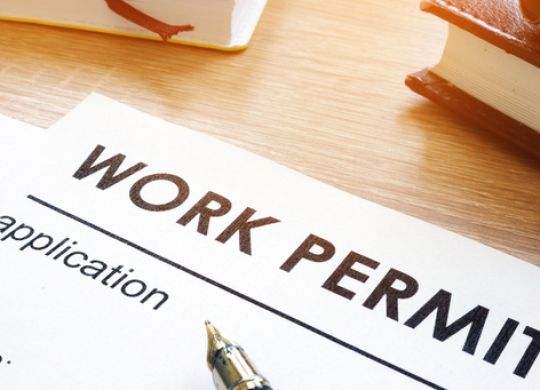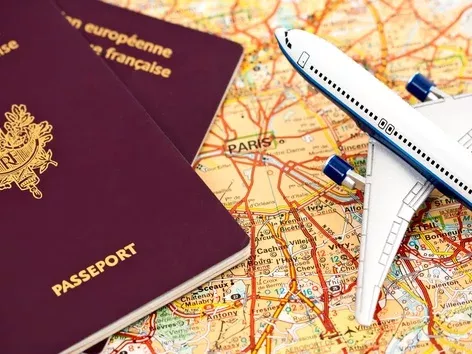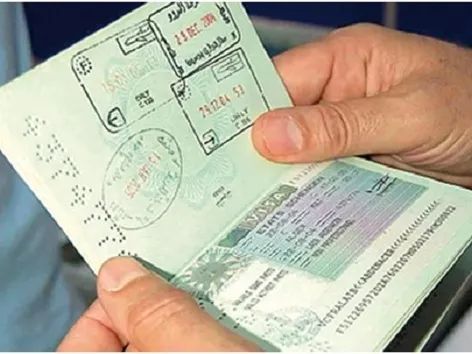Work permit in France: what changes should be expected from September 2024?

France implements strict rules for labor migrants, including fines for employers. Learn more about the procedure for obtaining a work permit in France
On September 1, 2024, a new immigration law will come into force in France aimed at tightening requirements for foreign workers. According to this law, when granting a work permit, the French authorities will take into account all three parties: the employer, the client and the host company, as reported by Schengen.News.
Under the new rules, employers wishing to hire foreign workers must meet certain criteria. In particular, the employer must not have a criminal record or administrative sanctions related to assisting in illegal entry or stay in France, causing harm to people or using fake documents. This law is intended to ensure greater transparency and accountability in the employment of foreigners in France, as well as to strengthen control over compliance with immigration regulations.
According to statistics, the largest number of labor migrants arrive in France from Morocco, Algeria, Tunisia and Romania.
To learn more about the important nuances of the employment procedure in France, please follow the link.
New French immigration rules for vulnerable workers
Starting from September, the French authorities will refuse to issue work permits if the recruitment project does not correspond to the employer's main economic activity. This innovation is aimed at ensuring that the tasks to be performed by the employee are in line with the activities of the employing company.
For seasonal workers, there is now an additional requirement: applicants must confirm that the employee will be provided with housing with proper living conditions. This measure was introduced in response to reports of unacceptable living conditions experienced by seasonal workers from third countries in the past.
Failure to comply with the rules on work permit renewal may result in significant fines exceeding EUR 20,000. In addition, host companies that hire apprentices or trainees from foreign employers are responsible for ensuring that the work permit process is conducted within the law.
Employers who fail to comply with these new requirements may face refusal to issue a work permit, as well as fines of up to EUR 20,750 per employee.
What countries are most likely to immigrate to France?
Algerians were among the main recipients of residence permits in France in 2023. Along with Moroccans and Tunisians, they received a significant number of first-time residence permits this year. Algerians are also one of the leading countries among those who have acquired French citizenship.
In total, France issued 336,954 residence permits in 2023. Moroccans received the largest number - 36,648, which is 11.2% of the total number of permits issued. Algerians took second place with 31,943 permits, or 9.7% of the total. In addition, it was Moroccan citizens who received the most French citizenship - 8,017 people, although this is 18.3% less than in 2022.
Among the citizens of the Maghreb countries, Algerians also stand out in obtaining French citizenship. In 2023, 6,737 Algerians became French citizens, and Tunisians ranked third among the most common nationalities to obtain citizenship - 3,841 people. These data indicate the significant role of Maghreb citizens in the demographic and social processes of France.
To move, travel or work safely in a new country, you will need health insurance. You can apply for an extended policy on our website here.
Types of work permits in France
Obtaining a work permit in France requires careful preparation of documents and compliance with the established procedures. It is important to familiarize yourself with all the requirements in advance and seek expert advice to avoid mistakes and delays in the process.
If you are planning to get a job in France and need assistance in obtaining a work permit, our experienced lawyers will provide you with the necessary support and advice at all stages of the process.
Short-term visa to work in France
A work visa for a period of up to 90 days allows you not only to work on seasonal jobs, but also to engage in professional activities in France. After this period, you must leave the country and apply for a new permit. In this case, the employer is responsible for obtaining a work permit through the local department for entrepreneurship, competition, consumption, work and employment (DIRECCTE). It is impossible to obtain a work visa without a positive decision from this authority.
To apply for a short-term work visa, you need to prepare the following package of documents:
- Two photographs of 35x45 mm in size. The face must occupy at least 70% of the image, the eyes must be clearly visible. It is forbidden to be photographed wearing hats and headphones.
- A completed application form in French and English.
- Employment contract. An original and a certified copy of the contract under which the applicant will work in France.
- A work permit issued by the DIRECCTE authority.
- Passports. National and international passports with copies of all filled pages are required.
- Income statement to prove financial solvency.
- Marriage or divorce certificate (if available).
- Information about booking tickets to France and back, indicating the date of return before the expiration of the visa.
- An insurance policy valid in the Schengen area.
- Certificate from the place of work with a detailed description of work activities for the last 6 months (position, duties, tax returns).
- Documents for private entrepreneurs: an extract from the Unified State Register of Legal Entities and Individual Entrepreneurs and a tax return.
Long-term visa to work in France
To legally stay in France for more than 90 days, you need to obtain a long-term work visa. This type of visa belongs to the category of national visas and is intended mainly for highly skilled workers. The visa application process begins with the employer applying to the French Office of Immigration and Integration (OFII) or a local DIRECCTE office for a permit. After obtaining the permit, the applicant can start preparing the necessary documents.
Here are the main documents that need to be prepared:
- Three photographs;
- Two questionnaires filled out in French and English;
- Authorization from the OFII or DIRECCTE obtained by the employer;
- Employment record book from the previous place of work;
- Reference from the last place of work, a copy of the employment contract and a resume;
- Employment contract signed by the host party in France;
- National and international passports with copies of all filled pages;
- Results of a full medical examination;
- Certificate from a doctor at the French Embassy.
This package of documents is mandatory for the successful application for a long-term work visa, which will allow you to work and reside in France legally.
EU Blue Card for employment in France 2024
Highly skilled workers from non-EU countries have the opportunity to obtain an EU Blue Card (Carte Bleue Européenne). This permit is granted if the applicant meets the following requirements:
1. Education or work experience. The applicant must have completed higher education with a minimum of three years of study at an accredited educational institution in his/her country or have at least five years of proven work experience in the specialty.
2. Salary. According to the terms of the employment contract, which must be signed for at least one year, the salary must exceed the average salary in France (about 53,000 euros) by at least 1.5 times.
The EU Blue Card is issued for a period of one to three years when first issued. In the future, it can be extended for up to 10 years, which gives the holder stability and the opportunity to work and live in France for a long time.
We remind you! France is among the most desirable countries for foreigners to obtain citizenship. The country attracts with its comfortable living conditions. Read more about what is required to obtain French citizenship.
Igor Usyk - Head of Migration department at VisitWorld
To ensure a safe trip abroad, I advise you to contact a specialist. My colleagues, qualified specialists with legal education, will help you avoid unpleasant situations while traveling around the world.
Products from Visit World for a comfortable trip:
Checklist for obtaining a visa and necessary documents in the France;
Legal advice on immigration to the France;
Travel insurance for foreigners in the France;
Medical insurance all over the world.
We monitor the accuracy and relevance of our information, so if you notice any errors or inconsistencies, please contact our hotline.
Recommended articles
2 min
Expats
The French government plans to pass a new immigration law again in 2025, just a year after the previous document, which came into effect in January 2024. This will be the 33rd French immigration law in 44 years. Find out what the law changed for expats in 2024 and what are the predictions for 2025
24 paź. 2024
More details2 min
Expats
Talent passport in France: a detailed guide for foreigners 2024
Artists, entrepreneurs, and scientists have the opportunity to live and work in France by obtaining a "Passport of Talent". Designed to boost the economy, this visa allows foreigners to live and work in the country for the first four years. Find out what the French Talent Passport is and everything you need to know about the four-year visa
04 mar. 2024
More details3 min
Expats
Types of French visas depending on the purpose of the trip: everything an expat needs to know
French migration law distinguishes several categories of visas depending on the duration of the trip and the purpose of the foreigner's stay in the country. Find out what types of French visas a foreigner can get in 2024
29 lip. 2024
More details2 min
Travels
TOP-10 Things to do in Paris Off the Beaten Path
From underground catacombs to suburban communes and abandoned railroads, Paris is full of secrets and historical mysteries. Find out more about the top 10 unusual things to do on your next trip to Paris
30 lip. 2024
More detailsAll materials and articles are owned by VisitWorld.Today and are protected by international intellectual property regulations. When using materials, approval from VisitWorld.Today is required.
